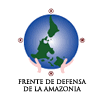Cornered By Evidence, Chevron Resorts To Increasingly Desperate Measures In Ecuador
Chevron Lawyers Harass Independent Laboratory To Hide Their Own Illegal Sampling Analyses

Amazon Defense Coalition
22 March 2006 - FOR IMMEDIATE RELEASE
Contact: Karen Hinton at +1.703.798.3109
Quito, Ecuador - Chevron is resorting to increasingly desperate measures to cover its tracks in the landmark environmental trial in Ecuador in which the oil giant faces a $6 billion clean-up tab.
With all 22 sites inspected by the court showing extensive toxic contamination left by Chevron, local lawyers for the oil giant are now trying to harass the independent laboratory used by the plaintiffs for analysis of scientific samples taken from contaminated sites.
"Since they cannot deny the toxic contamination at the sites, they are going after the independent lab that is producing proof of the scientific data," said Pablo Fajardo Mendoza, one of the lawyers for the affected communities. "This is an increasingly desperate measure by an increasingly desperate company."
Chevron's harassment of the lab, called HAVOC, comes on the heels of an embarrassing snafu caused by the company's local lawyers with its own laboratory, based in Houston, Texas. The Chevron lab in Houston has never been accredited by the Ecuadorian government, rendering illegal the use of those samples in the court action.
As a result, the results from all of Chevron's roughly 800 samples are expected to be nullified by the court, which would essentially destroy all of the company's evidence in the case up to this point. The samples cost approximately $2 million to analyze, creating a dilemma for the company and embarrassing the local lawyers, who have tried to cover their tracks.
In contrast, the HAVOC laboratory used by the plaintiffs is certified by the highly-respected Ecuadorian Accreditation Organization (OEA by its Spanish acronym), which conducts regular audits of Ecuadorian laboratories. In recent weeks, Chevron's lawyers have called HAVOC's clients to try to sway them to leave the lab in an effort to shut it down in a campaign of intimidation.
The most recent maneuver by Chevron was to ask a Quito-based judge to "inspect" the HAVOC lab - a request that has no legal basis, and has raised further suspicions of corruption by the Chevron lawyers. The Quito court has no legal basis to intervene in the pending case, which is being heard by the Superior Court of Nueva Loja, in the town of Lago Agrio.
"Chevron's lawyers are engaging in unethical conduct, yet again," said Alejandro Ponce Villacis, another lawyer for the affected communities. "The U.S.-based lawyers should take notice, because ultimately they are responsible for the unethical behavior of their local counsel."
There have been a series of corrupt acts carried out by Chevron over the course of the trial, which began in 2003, including the publication of a false military report by Chevron lawyers to suspend a critical judicial inspection on indigenous territory. Chevron's own sampling results have been devastating for the company -- for example, 98% of the water samples taken by the oil giant have shown toxic levels in violation of Ecuadorian law.
Despite the harassment perpetrated by the multinational corporation, the trial continues. The two parties have taken 1,088 soil and water samples, and 714 of them (or 66%) show levels of toxins in violation of Ecuadorian law. Thirty-nine inspections have been completed, with about a dozen more before the inspections phase ends. A final decision is expected in 2008.
The company has admitted that the amount of pure crude dumped is over 30 times greater than that caused by the infamous Exxon Valdez spill, but the company claims it caused no harm and that high rates of cancer in the region are unrelated to petroleum contamination.